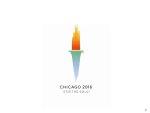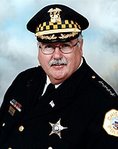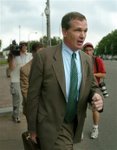After extensive consultation with experts and review of virtually ever possible document, plan, design and discussion, we have come to some basic conclusions on the wisdom of choosing Los Angeles or Chicago as a U.S. candidate for the 2016 Olympic Games.
LOS ANGELES
We strongly disagree with those who believe Los Angeles is at a disadvantage because they've "been there, done that." The 2016 Olympic Games will be 32 years after the 1984 Los Angeles Olympic Games, which was a clear success on every level.
Those who believe the International Olympic Committee (IOC) would not approve a candidate that hosted the Olympic Games previously twice only need to look at their most recent selection. 2012 will be the third time London has hosted the Olympic Games.
More relevant is how IOC members will view ANY candidate from the United States. The same people who believe Los Angeles is at a disadvantage for hosting the Olympic Games as recently as 1984 seem to bypass the issue of the United States being host to the Summer Olympic Games in 1996 (Atlanta) and the Winter Olympic Games in 2002 (Salt Lake).
There is validity to the concern the IOC wants fresh hosts, but that includes fresh countries and fresh continents such as South America, Africa and other parts of Asia.
The existing venues of Los Angeles and lack of need to build everything translate to low-risk. A review of Athens and what is happening in London is a reminder of what that means financially.
If Los Angeles is selected as the U.S. candidate for 2016, all IOC members from the United States and Peter Ueberroth, the Chairman of the U.S. Olympic Committee (USOC) and former head of the 1984 Los Angeles Olympic Games, reside in southern California, all who will be critical to lobbying for a successful U.S. candidate. Which city do they know best?
Los Angeles clearly has "star power" and international appeal inside and outside the Olympic world.
If the USOC chose Los Angeles as a candidate, it would be the lowest-risk choice. And, we have no doubt if Los Angeles were selected for 2016, there are solid reasons why to expect it be a success.
CHICAGO
Chicago has its own Olympic history. It was originally supposed to host the 1904 Olympic Games, but thanks to city politicians, it ended up going to St. Louis. We see some problems repeating itself when it comes to City of Chicago politics, but more on that later.
Daniel Burnham famously stated "make no little plans..." and is considered the visionary for modern Chicago. Pierre de Courbertin is considered the founder of the modern Olympic Movement and apparently was impressed by Chicago.
If you combine Daniel Burnham and Pierre de Coubertin, you get Akif Malik. He is the visionary behind the Chicago Olympic bid idea. In the early 1990's, he and the Chicago Metropolitan Organizing Committee (CMOC) launched the effort to once again connect Chicago with the Olympic world.
That process initially targeted the 2008, then 2012 Olympic Games. A task force commenced and sometime around 1997, Mayor Daley pulled his support from the independent process because of the financial guarantee issue--the same one that he now supports with a half-billion dollars.
Malik's original vision was grand, ambitious, bold, innovative and created a dyamic legacy for the Olympic Movement and the entire region directly and indirectly. It included various options for the current Olympic Stadium debate. One of those was for a retractable-roof multi-purpose lakefront stadium connected to McCormick Place that would not only justify the investment for an Olympic Games, but create incredible opportunities for conventions and other major events such as the Super Bowl and Final Four.
In 2005, after New York City was eliminated for 2012 when London narrowly defeated Paris, Malik again pursued the potential. This time, Mayor Daley reversed his stance and embraced the idea.
BE CAREFUL WHAT YOU WISH FOR...
We agree with the cynics who say the primary motive for Daley's reversal was political and under the cloud of corruption and torture scandals and a faltering legacy that could still end up with an indictment by U.S. Attorney Patrick Fitzgerald in the near future. But, who cares why, right? As long as Daley cooperates, that's good enough.
However, then we noticed something and partly blame the USOC for allowing it. While making sure the Mayor of the potential host city is totally cooperative, it opened the door for the City of Chicago to control the bid process and reshape it into what is in Daley's best interest, not necessarily the best interest of the region or the Olympic Movement.
And, that is when all the red flags started to be raised. Those who believe the City of Chicago and Mayor Daley know how to "get things done" haven't looked carefully into the incompetence and costs ranging from O'Hare to Millenium Park to Soldier Field. If an objective review were done of how Daley's regime has managed anything, one would conclude there are serious side effects of how Daley "gets things done." That's aside from the corruption and questions of telling the truth and straight facts the Chicago media consistently has to battle Daley with.
BILLION DOLLAR MISTAKE
Thus far, Daley has not taken responsibility for the billion dollar mistake of Soldier Field's renovation. That mistake shrunk Soldier Field's dimensions and seating for the interests of the Chicago Bears, partly owned by Patrick Ryan. No more track-n-field potential and it created the need for a new stadium.
Even if you took the proposed version of the temporary stadium proposed by Daley for Washington Park, something we find completely unappealing and believe the IOC will find even less appealing, that will make the Soldier Field mistake worth more than a billion dollars. Who's accountable for that?
The experts we have talked to all say the same thing. The temporary stadium idea is a stripped-down plan that lacks even basics of restrooms and a press box, then gets dismantled later. This is not going to be competitive on a world stage.
More importantly, the experts tell us the best solution hasn't been explored by Daley. That may include a permanent stadium and making Soldier Field the "temporary" stadium or a variety of other solutions that may be in the best interests of the Olympic Games and the region, but not necessarily the best interests of the City of Chicago.
"COMPACT GAMES" = CONTROL
That brings us to the other problem. This Chicago-centric plan, under the guise of making it a "compact Olympic Games" appears to disregard practical issues and strengths of the region. For Daley, all things are about control. And, it seems to us that is what is happening here. The original vision had no artificial boundaries for what would be best. The city's current plan seems to intentionally block non-city ideas while putting city interests ahead of the Olympic Games and region.
The reality is the vast majority of the Chicago area's population live outside Chicago's city limits, but the current process has failed to include anyone else, which is typical of the Chicago vs. suburb history, but not constructive to create the best possible Olympic bid.
If Chicago is selected by the USOC, it is critical full control over the rest of the bid process be managed by the USOC and not the City of Chicago. Anything less is a recipe for disaster.
WHY 2016?
Even if Daley magically let go of control and cooperated, is it likely that any U.S. candidate can prevail no matter how great the bid was when the U.S. is involved with two ongoing wars? Due to the invasion of Iraq, the credibility of the U.S. is at a low-point. One of Daley's talking points about how Chicago would be a great "American city" may actually work against us. Chicago is culturally diverse and that is much bigger selling point to international voters than being American. Those IOC voters are mostly accountable to their national populations that aren't very happy with America right now. President Bush will leave office in 2009, only a few months before the IOC chooses for 2016.
CHICAGO vs. LOS ANGELES
On paper, Los Angeles has a better current plan, lower risk and proven experience. However, under the original Burnham-Malik type of vision, Chicago has much greater potential if it could be a regional approach with strong legacy. At the moment, we have the Chicago-centric plan and that has some open-ended questions involving the stadium and village, among other things.
We believe Chicago and its surrounding region would be an incredible host someday, but under the current plans submitted, Los Angeles would be the safer choice, if we MUST proceed with either city as a candidate. In the Olympic bid process, losing has consequences. We think it would have been better to wait.
On April 14th, as much as we would like to see the Olympic Games come to Chicago eventually, we have objectively determined that Los Angeles is the better choice for now and would encourage the USOC to look for ways to build on the existing strengths of Los Angeles and create a dynamic international bid.
For those in Chicago, we urge everyone to look at this objectively and look forward to a post-Daley opportunity to do this the right way at a better time. Chicago and the surrounding region can and should be an Olympic host someday.
But, for now, we believe Los Angeles would be in the best interest of the Olympic Movement and even the best interest of Chicago, which could pursue a much better plan later if Los Angeles is not selected in 2009.






